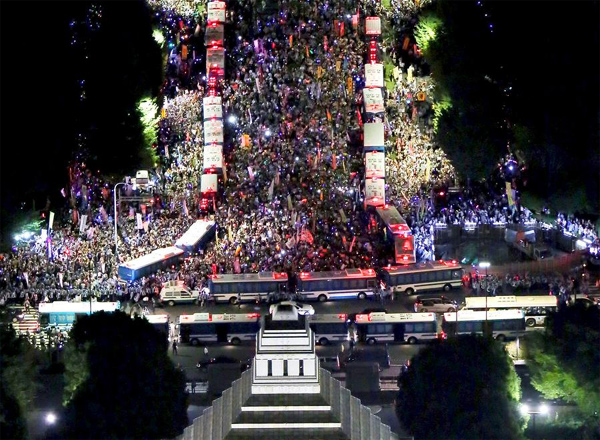Time for Abe to stop leading Japan astray
Updated: 2015-09-17 07:55
(China Daily)
|
|||||||||||
 |
|
An aerial view shows protesters gathering at a rally against Japan's Prime Minister Shinzo Abe's security bill and his administration, as police use parked buses to block protesters in front of the parliament building (bottom) in Tokyo, in this photo taken by Kyodo, Sept 14, 2015. [Photo/Agencies] |
The upper house of Japan's parliament has not yet made a decision on Japanese Prime Minister Shinzo Abe's controversial security bills on Wednesday. Once written into law, the controversial "war bills" could open a Pandora's box and push the island country away from its pacifist Constitution and toward a militaristic path.
Abe railroaded the bills through the lower house in July. And the approval from the upper house will give Abe the opportunity to fulfill the goal he set when he took office in December 2012, that is, to "lift the ban on collective self-defense, revise Japan-US defense cooperation guidelines and expand Japan's Self-Defense Forces' role overseas".
The security bills, if they become laws, will allow Japan's SDF to engage in conflicts overseas for the first time since World War II, as well as go into combat "under certain conditions" even if Japan itself is not attacked. This would be an obvious retrogression from the defensive defense policy which Japan has adhered to since World War II.
To make his case stronger, Abe has been playing up the "threats" faced by Japan. He and his cabinet ministers have echoed one another to raise a din over the "China threat" cliché, citing China's disputes with Japan over Diaoyu Islands while deliberately ignoring the fact that it was Japan that triggered the dispute.
At a joint news conference with visiting Communist Party of Vietnam leader Nguyen Phu Trongen on Monday, Abe issued a thinly veiled criticism of China over the disputes in the South China Sea and China's lawful reclamation project in its waters.
Despite his groundless accusations, Abe has not been able to fool even the Japanese people because ever since the controversial security bills were introduced they have been staging massive protests opposing his moves.
A poll published in Asahi Shimbun on Monday shows more than half of the respondents are against the security bills and the Abe government's approval rating has declined to 36 percent, the lowest since he took office.
Abe is hell-bent on setting up more obstacles on the road to reconciliation between Japan and its Asian neighbors, especially China and the Republic of Korea.
Abe is known for lending a deaf ear to what Japan's neighbors have to say about his unrepentant attitude toward history, but his rising unpopularity and Japanese people's vehement opposition to the security bills should be enough of a warning for him to not slip further in the wrong direction.
Related Stories
Abe's approval rating declines to lowest since late 2012 2015-09-15 12:50
45,000 Japanese protestors rally against Abe's security bills 2015-09-15 09:16
Abe's talk of proactive peace fails to convince 2015-09-14 07:58
US must rein in revisionist Abe government 2015-09-12 09:00
Self-deceiving Abe will tarnish Japan's image 2015-09-09 08:04
Abe re-elected head of party as vote on 'militaristic' bill nears 2015-09-09 08:03
Today's Top News
Migrants in Serbia reroute to Croatia
UK Labour leader Corbyn takes on ritual at first Cameron duel
Britain marks 75th anniversary of victory in Battle of Britain
Austria plans border checks as thousands refugees backlogged
Nation takes measures to ease green card access
China's Xi urges to open economy wider to world
Hungary locks down border
China business group in UK changes its name
Hot Topics
Lunar probe , China growth forecasts, Emission rules get tougher, China seen through 'colored lens', International board,
Editor's Picks

|

|

|

|

|

|






